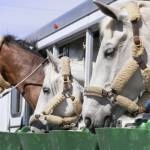Travel Tips for Your Horse’s Comfort

Whether your horse is a seasoned traveler or a green youngster in his first show season, you can make his trailering experiences more pleasant by preparing for the trip and keeping his safety and comfort in mind. Think about these considerations as you travel with your horse.
It goes without saying that your horse should be very familiar with leading, standing while tied, and walking quietly on and off the trailer. Training should be completed for these behaviors before you give any thought to actually transporting the horse.
Young or green horses will probably load better and stay calmer if a familiar quiet horse rides along in the trailer for the first few trips. Let the young horse see the older horse get into the trailer; then load the less experienced horse.
Blanketing, leg wraps, and leaving the horse tied or free are choices each horse owner must make. Generally horses stay warm in the trailer, especially if more than one horse is being transported, and blanketing may cause overheating. Leg bandages or wraps protect against possible wounds as the horse moves around in the trailer, but they can add to the risk of overheating on a long trip. Be sure the horse’s lead rope is tied with enough slack that the horse can lower his head. Some horses balance more easily if they are not tied.
If your horse normally gets fed in the morning, it may be a good idea to reduce the amount of grain fed before the trip. Some owners give their horses a digestive tract conditioner before and after traveling to guard against gastric ulcers and balance hindgut pH to avoid gastrointestinal upsets.
Munching on hay keeps horses calmer and gives them something to do on the journey. Tie nets high enough to prevent horses getting a leg caught in them. If hay is dusty, dipping the filled hay net into a bucket of water and letting it drain before putting it in the trailer will decrease the amount of dust blowing around the trailer and getting in the horse’s eyes. Damp hay left hanging in the trailer may begin to mold in hot weather, so new hay should be used for the trip home.
Keep in mind that, though you can see the road ahead as you drive, every curve, bump, start, and stop is a surprise for the horse. He must constantly shift his weight to keep his balance, even on roads that are in good condition. This is tiring, so plan to stop every three or four hours on long trips and give your horse a chance to relax and rest his legs. Don’t unload him! Just check on him, make sure the trailer is well ventilated, and offer him a drink of water. After 20 minutes or so, offer water again and then resume your trip.
When you reach your destination, unload the horse, offer water, take off wraps or bandages, and either hand-walk him or turn him out for half an hour or longer, if possible. This gives the horse a chance to stretch and get some fresh forage into his stomach. Give the horse every opportunity to drink water and relax before you ask him for any work.








